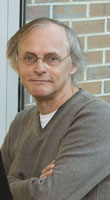"S & T in the Context of Globalization: The Internationalization of Scientific Research" Workshop by Prof. Yves Gingras, May 16
On May 16th Prof. Yves Gingras has delivered a workshop "S & T in the Context of Globalization: The Internationalization of Scientific Research" at the HSE. The event has been organized by the Research Laboratory of Science and Technology Studies, HSE Institute for Statistical Studies and Economics of Knowledge.
 Yves Gingras is Professor in the Department of History at the University of Quebec in Montreal, former Director of the Interuniversity Research Center on Science and Technology (CIRST), Scientific Director of the Observatory of Science and Technology (OST), and Canada Research Chair in History and Sociology of Science.
Yves Gingras is Professor in the Department of History at the University of Quebec in Montreal, former Director of the Interuniversity Research Center on Science and Technology (CIRST), Scientific Director of the Observatory of Science and Technology (OST), and Canada Research Chair in History and Sociology of Science.
The lecturer noted that science is inherently international in its nature since the moment of emergence. Initially, interaction of scientists was restricted to exchange of ideas through correspondence, traveling, etc. Direct cooperation in projects has been adopted in the scientific practice only in the XIX century. The growing internationalization of research is indicated by an exponential increase in the number of joint publications by the authors from different countries. Such a process started in the twentieth century, and, except for breaks during the First and Second World Wars, continues today. At the same time we observe "collectivization" of science i.e. increasing proportion of articles written in collaboration (by the two or more authors).
The trend towards increasing international cooperation in conducting joint research covers all academic areas except humanitarian. The speaker illustrated it with the case of Russia, where the number of joint publications with foreign authors has increased from 3% in 1980 to 35% in 2005.
Prof. Gingras has also analyzed the dynamics of evolution of international and regional cooperation networks since 1970, with detailed .jpg) focusing on the Russia’s case. Using the community detection techniques he demonstrated the changing Russia’s role in the network of post-Soviet states and in international networks. The methodology allows determining country’s position (centrality) in these networks and identifying its key research partners.
focusing on the Russia’s case. Using the community detection techniques he demonstrated the changing Russia’s role in the network of post-Soviet states and in international networks. The methodology allows determining country’s position (centrality) in these networks and identifying its key research partners.
The lecturer has concluded that during the XX century Russian science was increasingly internationalizing and diversifying scientific relations. Despite the fact that Russia since the collapse of the Soviet Union began to move to the periphery of world science system, it nevertheless remains a center of attraction for a number of former Soviet republics: Ukraine, Georgia and Central Asia.
Responding to questions from audience, Yves Gingras clarified prerequisites for the growing level of international cooperation in science, e.g. the increasing costs of materials base and growing division of labor. He touched upon a trouble caused by variations in standards for specifying the names of authors. Finally, basing on citation indexes, Yves Gingras has analysed changing knowledge flows in the context of science internationalization.

